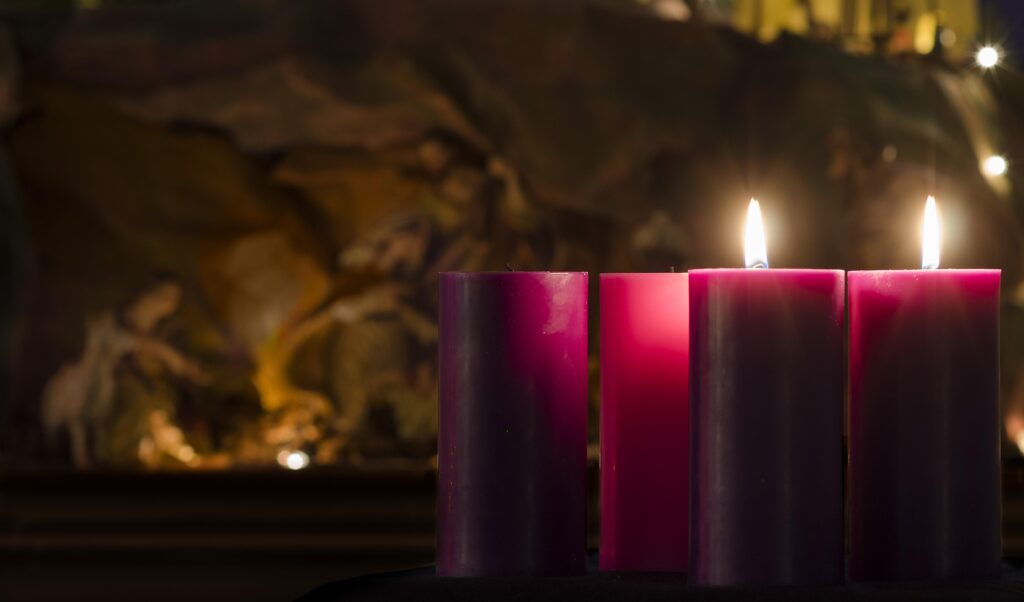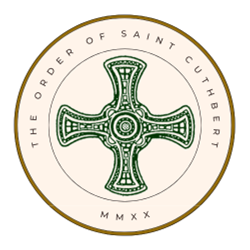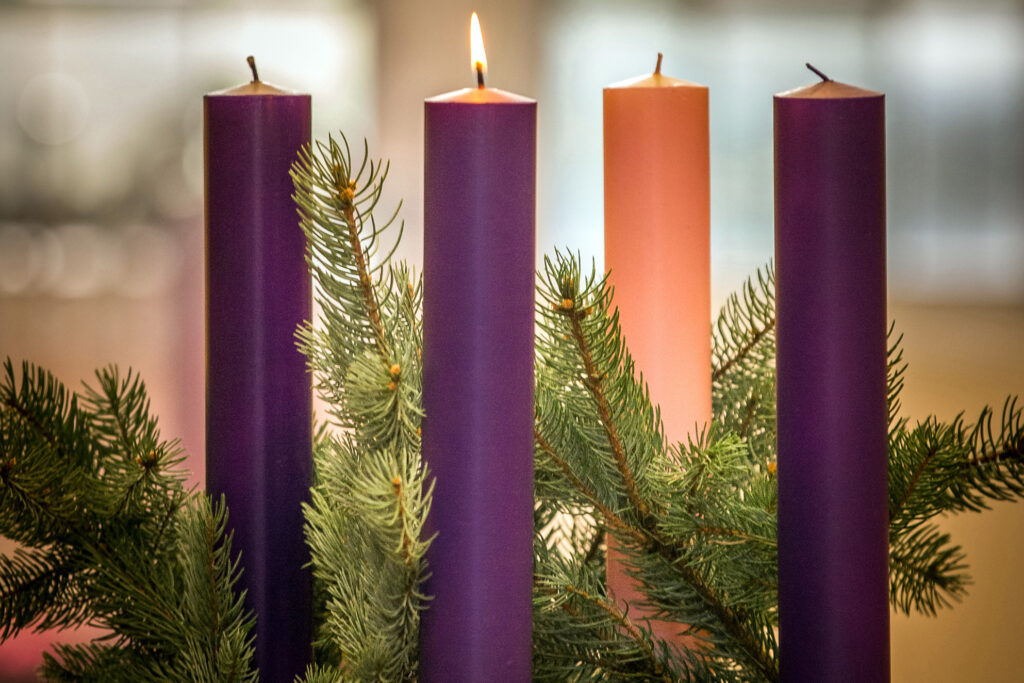
Greetings this second week of Advent. May the grace of our Lord Jesus Christ, and the love of God, and the fellowship of the Holy Spirit be with you all. The collect appointed for this week is one of my favorites of the Christian year.
Blessed Lord, who caused all Holy Scriptures to be written for our learning: Grant us so to hear them, read, mark, learn, and inwardly digest them, that by patience and the comfort of your holy Word we may embrace and ever hold fast the blessed hope of everlasting life, which you have given us in our Savior Jesus Christ; who lives and reigns with you and the Holy Spirit, one God, for ever and ever. Amen. (BCP, 2019, Advent 2)
We are called to remember that Holy Scriptures are provided to us by God for the purpose of our learning and that through Holy Scripture and the Holy Spirit we are to hold fast to the blessed hope of everlasting life. Through this prayer, we are reminded to hear, read, mark and inwardly digest the Scripture. It calls us to greater commitment to the Word of God, to the truth.
That is something sorely lacking in our world and even throughout the church. A commitment, a stand for the truth. We live in a world which is infatuated with the idea of relativism, that your truth is just as valid as my truth, or perhaps even that no truth exists at all. That is incompatible with the Christian faith—we are told the Jesus is the Way, The Truth, and the Life.
Are we ready to stand for the truth? To be dedicated to the pursuit of it, ready to proclaim it, to never be ashamed of it. As we consider during this advent season what the coming of the Lord means, both his first coming and his second, we must consider the implications of what it means to accept the Lord, the Gospel, as truth.
The Gospel lesson for the second Sunday of Advent opened by quoting the prophet Isaiah, by drawing attention to the work and ministry of Saint John the Baptist as the one who had come to prepare the way. To prepare the way for the Way. He did so by issuing a call to repentance, to re-orientation to God. A call to examine ourselves and look to those areas of our life where we need to ask God’s forgiveness, and to recommit ourselves to God.
That is the task of this season of advent, prepare the way for the coming of Christ. He is coming, are we prepared? It is the task of every gathering of the church, to prepare our hearts, our minds, our souls for the coming of our Lord, to be ready to receive him in hopeful anticipation.
We are told that John was ministering to people in the wilderness, that he was clothed in camels’ hair with a leather belt around his waist, that he ate locusts and wild honey. Basically, that he was strange, that he was counter cultural, not aligned with the mainstream of Jewish or roman society.
In order to truly prepare the way of the Lord in our lives we must also be counter cultural. We are not called to conform ourselves to this world, but rather to be conformed to the image and likeness of Christ. That requires that we hold to beliefs and convictions which will be counter to this world. That we maintain disciplines, customs, and practices that this world does not understand or accept. That we recognize and stand for truth, when this world denies that it even exists.
The same passage from the prophet Isaiah that Saint Mark is referencing in this Gospel passage tells us that this world will pass away, it is temporary, like the grass which withers and is carried away by the wind, the breath of God. This world, this culture, its beliefs, its convictions, its ambitions will pass away, they will fade from existence like countless before them, but we are told that the Word of the Lord will endure, it will stand forever.
Every day we must choose the world or the Word, we must choose the truth, the way and the life that is Christ our Lord. Saint Peter echoes this when he tells us that these things are to be dissolved—the heavenly bodies will melt as the burn. He reminds us that the day of the Lord’s return will be as a thief, it will seem to sneak up on those who are unaware, but we are called to always be prepared. To wait in hopeful anticipation, to be patient.
One day for the Lord is as a thousand years for us. What seems like a delay to us is really just the patience of the Lord, not wishing that any should perish but rather that all should repent. We are to count the patience of the Lord as salvation. Just as our collect admonishes us to hear, read, mark and inwardly digest Holy Scripture, Saint peter reminds us here that we are to take care that we are not carried away with the error of lawless people and lose our own stability.
This passage from Saint Peter’s epistle is one of the earliest references to the Scriptures of the New Testament, what we call the Canon of Scripture, or the list of what writings are considered authoritative. He references the writings of Saint Paul, which we know makes up most of our New Testament. In doing so, not only does he affirm that the writings of the Apostles were well known in the earliest days of the church and likely shared and circulated among the churches, but he also draws our attention to a common error that continues to plague the church to this day.
The error of those who are ignorant and unstable and twist the meaning of Scripture, to their own destruction. This was a problem during the Apostolic age, and it remains a problem today. It only reiterates why we must be diligent in our pursuit of understanding and in our willingness to stand up for truth and against heresy and false teaching. We must remind ourselves, the Church, to be counter cultural, stand for the truth of Christ, choose the Word of the World.
How do we know what is truth and error? You can name almost any sin and I can find you a supposedly Christian church which affirms it as ok. Murder, there are churches which support abortion, which is the sin of murder. Sexual immorality, there are churches which completely reject the biblical teaching of sexual morality and righteousness. Slavery, we don’t have to look very far in our past to see countless examples of Scripture twisted and used to defend and promote slavery and countless other sins.
Just because it comes from the pulpit and includes scripture references does not make it truth. So how do we rightly discern what is and is not truth? Every day we confess the creeds of our faith.
As Anglican’s we are not a confessional church, as the term is often applied. Rather, we are a creedal church, affirming the faith of the One Holy Catholic and Apostolic Church. That is our method of discernment. That is how we know truth from the twisted misrepresentations of those who are unstable and ignorant.
We affirm the Truth as it has been taught by the Apostles as it has been guarded and defended by the Church, in that we find our stability. Question ninety-eight in the ACNA’s catechism, To Be a Christian, answers why the Church is called Catholic: “The church is called catholic (which means according to the whole) because it keeps the whole faith it has received from the Lord, in continuity with the whole church in all times and places.”
In continuity with the whole church in all times and places. That is an incredibility important statement. Arguably one of the most important statements in the entire catechism. It represents the standard of scrutiny required to discern truth. Is what I believe, what I teach, what I am hearing in continuity with the whole church in all times and places, with the teaching of the Apostles, with Holy Scripture, or is it something else, something new?
There are many who in their ignorance and instability have twisted Holy Scripture, which Saint Peter admits can be difficult to understand, into a variety of errant and heretical beliefs which are not in continuity with what the Apostles taught and what the Church has believed in all times and in places. Any teaching, no matter if it come from me, a bishop, or even a council, if it is incongruent with the faith that has been believed in all times and places, is likely an errant twisting of Scripture, perhaps unintentional, but no less dangerous.
There is great consistency and congruence in our faith. Holy Scripture today demonstrate that. From the teaching of the prophets to the teaching of the Apostles, it is one catholic faith, consistent and congruent. The Word of God is forever, it will stand forever. The Word of God has become flesh and dwelt among us in the person of Jesus Christ.
Behold, the LORD God comes with might, and his arm rules for him; behold, his reward is with him, and his recompense before him. He will tend his flock like a shepherd; he will gather the lambs in his arms; he will carry them in his bosom, and gently lead those that are with young.
We are called to prepare the way of the Lord, in this world and in our own hearts. Are you prepared?
Almighty and gracious Lord. You have come and dwelt among us. You, who are the Way, the Truth, and the Life have brought us salvation. Grant us the grace to faithfully discern your Truth and Your will and to stand strong and confident in Your truth with humility through the work of the Holy Spirit that we might be found ready at Your second coming. We ask this in Your most honored name Lord Jesus, who lives and reigns with the Father and the Holy Spirit, One God, now and evermore. Amen.
Blessings,
Kenneth++
Abbot, OSC


